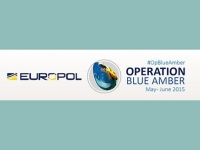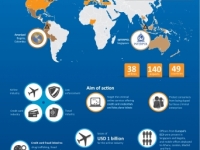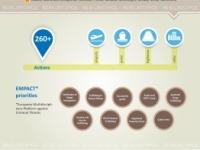Politics
Arrested 130 people in a global operation against criminal organizations
Deployed in 140 airports in 49 countries
The operation, coordinated by Europol and Interpol, was held in 140 airports from five continents located in 49 countries (25 in Europe) and arrested 130 people. This action is part of the named Operation Blue Amber, international action concocted by Europol to fight organized crime on several fronts. A total of 38 companies (33 airlines and five travel agencies in Europe) informed the police of a number of frauds committed at the airports during the days of the operation. The payment card networks, card issuers, Perseuss and the International Air Transport Association (IATA) supported the operation by providing information to confirm the suspected fraudulent transactions airline tickets.
Other international organizations, such as Eurojust and Frontex, officials deployed at 12 airports in Europe. During the two days in which the operation took place, a command post was established in the European Cybercrime Centre Europol (EC3), which was supplemented with the commanding of Interpol in Singapore, Ameripol in Bogota and another in Canada . At the helm of Europol, the representatives of the private sector (airlines and credit card companies American Express, MasterCard, Visa, Visa Inc. and Visa Europe) worked together to identify the suspicious transactions and report them immediately to the police officers deployed at airports.
During the operation, 222 suspicious transactions (163 in Europe, 23 in Asia and the Pacific, 18 in Latin America and 18 in Canada) were detected. As a result they were arrested a total of 130 people (101 in Europe, 11 in Asia and the Pacific, 10 in Latin America, 2 in the United States and 6 in Canada). In Spain, the operation was coordinated by the Intelligence Centre against Terrorism and Organized Crime (CITCO its Spanish acronym) and acted in airports Adolfo Suarez Madrid Barajas, Barcelona-El Prat, Malaga-Costa del Sol and Palma de Mallorca-Son Sant Joan, where the Civil Guard and National Police arrested two people.
Research shows that, in many cases, this type of fraud is related to other forms of serious crime. During operation of 16 and 17 June, the detainees were involved in other forms of crime such as trafficking in human beings, illegal immigration, smuggling of goods, drug trafficking, fraud, cybercrime and terrorism . Therefore, these operations are very effective to discover other forms of serious crime, providing greater security at airports. Such transactions, which is tested international cooperation, are part of the so-called political cycle of the European Union against organized crime, which is managed from a platform known as EMPACT (Multidisciplinary European Platform against Criminal Threats), coordinated from Europol.
In that sense, between May 4 and June 24, Europol developed an international macroperacion against organized crime which resulted in more than 500 detainees in 260 locations around the world and in which 2.8 tons of seized cocaine from Latin America and bound for Europe, 110 kilos of heroin, 390 vehicles and 1,300 tonnes of stolen metal. In this operation participated, along with the Member States of the European Union, 30 other countries, including Colombia, Brazil, Panama, Ecuador, Costa Rica, Peru, Mexico, Guatemala and Bolivia, as well as Interpol and the Community Police of the Americas (Ameripol), among others.
The modus operandi of criminals confirms the growing use of containers to transport large quantities of drugs and through smaller packages and "e". Several of the police actions were carried out at airports, border crossings, ports and usual places where there is high concentration of such activities. The "e" flew cocaine from Latin America to Europe, while heroin from Afghanistan and Pakistan, was traveling in packs daily. The drug was hidden in clothing and shoe soles, but has also been found heroin in packages of drugs.
As part of Operation Blue Amber, they had also been arrested several intermediaries irregularly introduce people in Europe thanks to the cooperation of the countries of the Western Balkans. Indeed, in Hungary a safe house linked to illegal immigration was discovered. Europol Director, Rob Wainwright, explained that "once again we have seen that successful international cooperation can have a huge impact against organized crime. The result of this operation, with more than 500 arrests, is a direct message to the that criminals should not feel safe anywhere." Wainwright said that Europol will continue to support the police and judicial authorities of the Member States of the EU through "his unique intelligence and technical capabilities."
Liability for this article lies with the author, who also holds the copyright. Editorial content from USPA may be quoted on other websites as long as the quote comprises no more than 5% of the entire text, is marked as such and the source is named (via hyperlink).








